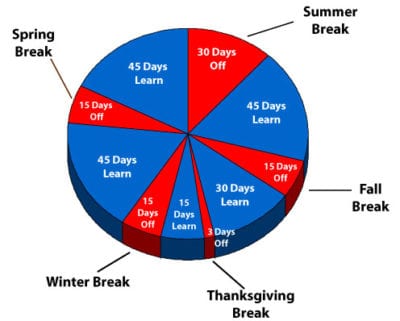8 Reasons Common Core Will Ultimately Fail

By Matthew Lynch
Since their initial implementation, national Common Core standards have caused quite a stir. It seems that everyone from politicians to parents have an opinion on these learning benchmarks and their corresponding testing systems. Everyone is throwing his or her two cents into the Common Core discussion and it has all led to a firestorm of questions surrounding the future of K-12 education in the U.S. and whether one streamlined goal program can really be effective with all students.
As a disclaimer, I actually support a lot of the components of Common Core and believe that heightened, more focused teaching toward subjects like math and science are necessary for this generation of K-12 students to survive and thrive in the future world workplace. Despite my personal feelings on the heart of Common Core standards, however, the initiatives are misdirected in more ways than one and will be rendered ineffective in the end. Here are just a few of the reasons I feel this way:
- Common Core is tied to President Obama.
Even though President Obama did not draft or implement Common Core standards, he is inextricably linked to them. This is due in part to the fact that his Race to the Top program connects federal funding with states that have Common Core standards in place and who excel in the testing of the material. The President has certainly put his weight behind the ideals of Common Core standards and has always been vocal about his belief that streamlined learning benchmarks and continued teacher accountability is necessary for the future of the nation’s economy and knowledge base. He did not, however, come up with the idea for Common Core standards nor approve them upon completion. The bi-partisan National Governors Association did that. Still, people who already dislike President Obama seem to think that passionately disliking Common Core is just another way to show their disapproval of his administration. While this specific group is certainly not large enough to topple the standards alone, it is influential, particularly when it comes to politicians that are looking for an easy way to please constituents. Which brings me to my next point…
- Politicians are using Common Core as a platform.
Republican governor of Indiana Mike Pence was once a supporter of Common Core initiatives, and so was Republican Louisiana governor Bobby Jindal. Yet both are now some of the most prominent politicians to speak out against Common Core standards – and in the case of Pence, he has since withdrawn Indiana from the program (and then replaced the standards with eerily similar “state developed” ones). It seems that Common Core is becoming a platform for politicians looking for their next news byte or front-page photo op. It’s not limited to politicians in office, either.
In April, Republican Rob Astorino of New York, a gubernatorial hopeful, made a public announcement that his own children would not be taking state assessments based on Common Core benchmarks. The spotlight-stealing is not limited to Republicans, of course. Just this month Virginian democrat Adam Ebbin who hopes to replace long-time Senator Jim Moran said he does not support Common Core standards (which Virginia has so far opted out of using). Politicians from both sides of the aisle are seeing the fiery side of their constituents and looking for a way to push that passion in their own directions.
- Parents think common core standards are too rigorous.
The heightened concepts of learning and retaining Common Core materials means that some students will get left behind. The aggressiveness of the learning campaigns, however, make it difficult for teachers to spend extra time on subjects or circle back to them once most of the class has retained them. In a perfect world, this is where the parents would step in and fill the gap, or at least hire a tutor to do it. Ever since No Child Left Behind legislation, however, the assumption is that public schools are responsible for the total learning process of all their students. Parents who find that Common Core is leaving their own children behind find it easier to point the finger at the standards instead of initiating a way to make them work for their kids.
- Parents don’t understand the material.
Particularly when it comes to math, some of the new-fangled methods that Common Core implements are foreign to parents. Moms and dads who remember excelling in elementary school math are suddenly befuddled by the homework questions their second-graders must figure out. Parents, even the very young ones, did not use many of the tactics now in place in K-12 classrooms and certainly were not required to learn as many complicated subjects at such a young age. This lack of comprehension translates to lack of confidence – and causes parents to become defensive about the materials their children are expected to learn.
- Parents are growing wary of the testing culture.
Parents are a finicky bunch when it comes to education. They want the best career opportunities for their kids but resent the idea of teaching too specifically for the simple sake of scoring higher on an assessment test. The items on state assessment tests, more than ever, are designed to test the knowledge set deemed appropriate for the future economy (in part, at least). Though parents want the best job opportunities for their kids, they don’t want knowledge to be so narrowly dispersed. The truth is that no teacher has enough time to teach everything to his or her students. Some of that learning must happen at home and in other real-world applications.
Standards are a calculated guess as to what learning materials should be prioritized among U.S. students – not an end-all-be-all list. Parents see items that they deem “important” missing from Common Core standards and believe it signals a complete dysfunction of the benchmarks. The growing movement to protest or even eliminate standardized tests is being driven mostly by parents. Though it’s unlikely that they will ever truly succeed on this front, their outspoken concerns about Common Core will eventually aid in dismantling the standards – particularly if their political representatives are listening.
- American students are diverse.
It seems everywhere you look, we celebrate diversity in this country. From skin color, to language spoken, to sexual preferences, the national message seems to be “Be you. Whatever that looks like.” Except when it comes to measuring a “good” education. It’s widely accepted that students learn in different ways and customized learning initiatives are a trend fueled by in-classroom technology. HOW students learn is varied, but WHAT they are learning is somehow expected to fall into some neat, standardized package. Laying down countrywide rules of sorts for learning, and attaching those to funding, is an easy way to check off boxes on a spreadsheet but not an effective way to teach each student exactly what he or she needs to know based on career paths, interests and life circumstance
- It doesn’t recognize the differences among states.
It’s true that the world is becoming smaller and that the differences that once divided K-12 students by geography are shrinking. Still, there are some learning standards that just make more sense in one area over another. The benefits of learning a foreign language should be shared on a national level, but the specifics of those benchmarks should be considered. A state like Arizona or Texas, for example, with a high percentage of Spanish-speakers could benefit from more curriculum customized to that population, and in a much more effective way than a state like Iowa or Maine. Common Core is not a curriculum set, of course, but I use the language example as a way to show the difference between students and how where they live really does impact what they really should know. Industry specific learning is also a consideration when it comes to what should be taught more heavily, not as a way to pigeon-hole students but as a way to set them up for the best chance at career success. Considerations for subject areas that have been weak in a particular region should also be thought about and given priority.
- There is not one model student.
The idea that all U.S. K-12 students should know exactly the same things, and graduate from high school with the same shared learning experiences is flawed. Of course no one expects any two students to be identical in their learning outcomes, but the implication of Common Core standards are that there should be a cookie-cutter which every district and every teacher uses. Such an educational model goes against every other American ideal – like innovation, creativity and individuality – yet is prevalent throughout the public school system. If there were one leading flaw in Common Core requirements, it would be this: it allows no wiggle room for letting students be the people they were meant to be.
Hopefully, proponents of Common Core will read this piece, correct its deficiencies, and prove me wrong.





